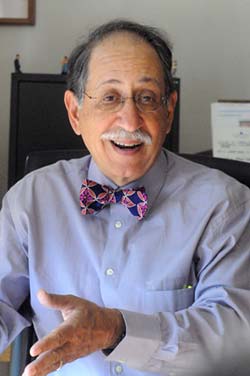Thus, here I write. Partially in reflection of my own moderately comfortable situation despite the economic hardships at the moment, but mostly in admiration for this astounding human being I never knew until now.
The article, from UC Berkeley news, is about this year's Nobel Prize winner in Economic Sciences who has gone out and lived in poverty on purpose--not to "study" our poor per se, but rather, to embrace them and for once learn from them for a change.
 He is Martín Sánchez-Jankowski, Ph.D. But here's the real kicker--the man grew up in poverty in rural Mexico. He's come out of poverty, achieved great educational feats, and now he's a true warrior on a mission to not just give a damn, but also do something monumental. And he's packed with all his knowledge, all his cultural capital, and all his dutiful fury.
He is Martín Sánchez-Jankowski, Ph.D. But here's the real kicker--the man grew up in poverty in rural Mexico. He's come out of poverty, achieved great educational feats, and now he's a true warrior on a mission to not just give a damn, but also do something monumental. And he's packed with all his knowledge, all his cultural capital, and all his dutiful fury.This man is my hero. He is actively, passionately, and usefully rolling up his sleeves and putting his academic butt to work. I mean that with all due respect. Here is a little from the article, but the entire thing is more than worth reading, it is necessary. There is so much to learn...
"Cracking The Chronic Poverty Code"
He spent most of the 1990s living in housing projects in five chronically poor neighborhoods in New York and Los Angeles, documenting what he calls the “subculture of scarcity” for the recently published Cracks in the Pavement: Social Change and Resilience in Poor Neighborhoods (UC Press).
What he discovered was that the poor, to paraphrase F. Scott Fitzgerald, are different — albeit not in the ways that other sociologists (and many political conservatives) have argued for decades. Impoverished neighborhoods, Sánchez-Jankowski learned, exhibit a fierce sense of self-preservation, constantly reinforcing values that serve to maintain the status quo while protecting against those that threaten their local culture, whether the source is state agencies seeking to impose order or foreign immigrants who bring their alien cultures into public-housing projects.
It’s not that the poor don’t aspire to status and material wealth, in his view. But due to the perception that they’re less likely to achieve them in the ways that middle-class people do — via well-paying jobs, for example — residents of poor neighborhoods are more apt to embrace, or at least tolerate, the underground economy. Similarly, absent the level of social services on which middle-class people regularly depend, gangs and other local institutions often step up to play a constructive role in low-income communities.
No comments:
Post a Comment